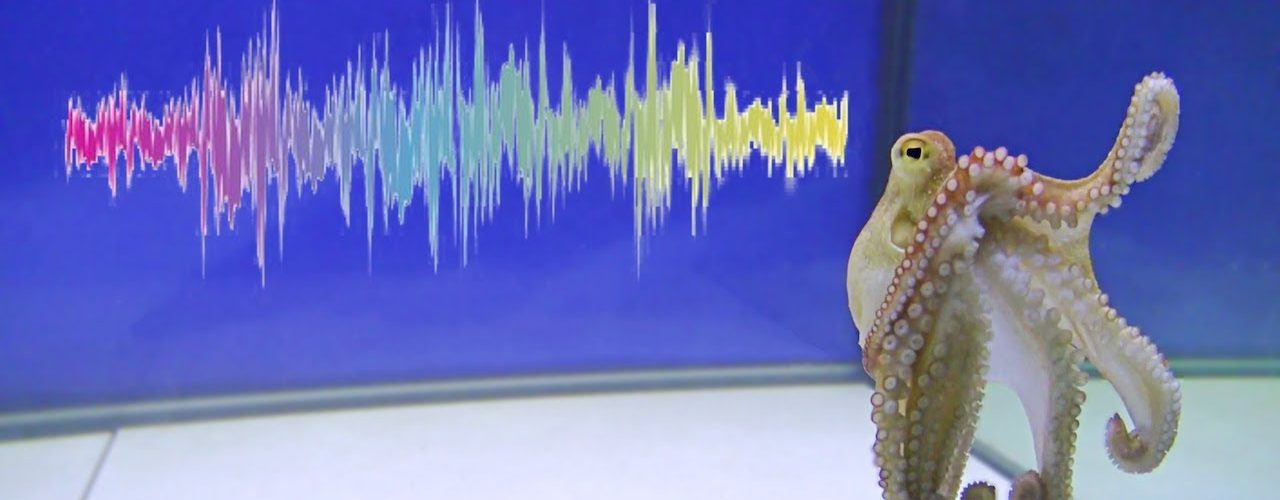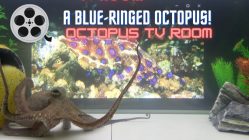Mr. Octopus, Can You Hear Me Now?
Okay, we know that octopuses are highly advanced creatures. Their level of intelligence and cognition has been observed on repeated occasions.
We are also aware of their unique nervous system. How they are able to “taste” via nerve sensors on the skin of their arms. For some species, their eyesight, even though likely colorblind, is acute and well adapted for seeking out prey.
All in all, octopuses appear to be smart and sensory-packed creatures finely-tuned to master their surroundings. Tactile, gustatory (that’s “taste” for us common folk,) and visual senses all play their role in providing octopuses with vital input from their environment.
What About Hearing? Can Octopuses Hear or Are They Deaf?
While it’s true that octopuses do not have any organs or specific body adaptations required to specifically discern sound, the question of octopus “hearing” has been posed before by marine biologists.
Before you ask, “how can a creature hear without ears?” You should be aware that there are non-traditional ways to “hear.” In our human world, you can look at instances in which deaf people can detect sound by placing their hand on a vibrating speaker. Some can even recognize differences in the vibrations to such a degree that they can recognize musical patterns or specific words.
While octopuses may not “hear” in the traditional sense, that does not eliminate the possibility that they can detect sound frequencies resonating through the water. In other words, ears and eardrums are not a prerequisite to detect sound frequency. Yes, octopuses may not be able to appreciate the nuance of a Beethoven symphony, but maybe, just maybe, they can detect sound vibrations in the water in some capacity.
This is why Octolab decided to conduct a series of experiments to determine whether or not octopuses can hear.
It’s All About the Frequency
In this particular video, a series of sounds in specific frequencies were played through speakers placed against the wall of one of the observation tanks.
The frequencies used were 30, 50, 80, 100, 150, 200, 300, 350, 400, 500, 700, 750, and 1,000 hertz.
It’s All Observational
In the video, you will notice that the nature of the experiment is purely observational. Our eight-armed subject is not hooked up to sensors to measure his response. The experiment is in line with the Octolab philosophy of learning through observation, not intrusion or intervention.
This is also why the more eyes on our subject, the more information that we can discern from the experiment. In other words, this is where you, the octopus enthusiast, can play a direct role. Watch the video carefully. Did you detect the octopus reacting to any of the frequencies? If so, how? Please, leave a comment and let us know.
This is our first of many auditory experiments with octopuses. This is an excellent opportunity for you to become directly involved in exploring an area of octopus life that is as of yet under-explored.
Word to the wise, when watching the video, it’s okay to lower or mute the volume. While we may not be sure as to whether or not octopuses can “hear,” we do know that some of these frequencies might be irritating to human ears.













Hello, just a wee beginner marine biologist here but I definitely think something is happening. In almost every video (per different sound frequency) the octopus shows great interest with the tank glass by pressing itself onto it, stretching its tentacles out on it and moving along the glass while keeping tentacles stretched in one way or another. Perhaps it can feel the sound vibrations from the tank glass and is curious?
There definitely seems to be some reaction to each frequency. At 400 Hertz, as he’s moving towards the back of the tank, he appears to stop abruptly as the sound hits. Surely, they’re not completely deaf.